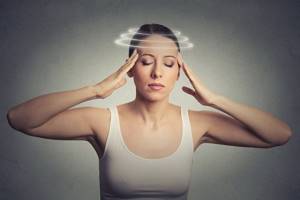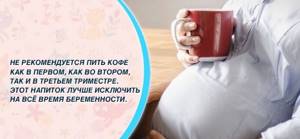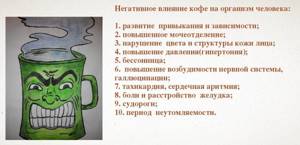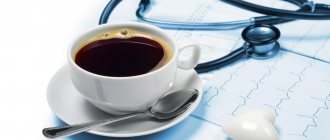Effects of caffeine on the body
The invigorating effect of coffee on the human body is associated with the presence of an alkaloid in its composition - caffeine. Like other similar substances, it is addictive. Therefore, experts do not advise drinking the drink too often. Consider the effect of caffeine on the body:
- After consumption, brain activity increases, the head is clear, thoughts come into order and have a clear structure.
- The cardiovascular system also becomes toned. The heart rate increases, blood moves through the vessels faster than usual, and has a stronger effect on their walls. Consequently, blood pressure rises.
- The accumulated fatigue quickly disappears, the person is ready for fruitful work.
- The digestive system is also activated, appetite increases, and food is absorbed more intensively.
Important! Caffeine negatively affects the normal functioning of the reproductive system. It is especially important for nulliparous women to know this. In addition, drinking up to five cups of coffee a day for three years can lead to infertility.
Effect of caffeine on the human brain
The coffee drink helps stimulate brain receptors. As a result, after drinking a cup of coffee, the commands that the human brain produces are distorted and transformed. The brain produces a special substance - adenosine, which is a neurotransmitter. Its production occurs around the clock, but the amount may vary depending on whether a person is awake or resting. Adenosine can slow down the action of brain neurons, which is a signal for the brain to rest.
Adenosine affects the blood vessels that supply the brain. It attaches to brain receptors and causes vasodilation. Under the influence of adenosine, neurons are abundantly supplied with oxygen during night rest.
When caffeine enters the blood, the process of replacing adenosine with it occurs, since caffeine is similar in structure to it. The body does not receive signals that it is time to rest, and the blood vessels undergo severe constriction. This leads to headache or dizziness.
Drinks containing caffeine are not recommended to be taken in the afternoon. The effect of caffeine on the body does not occur immediately, which is why sleep problems arise. The brain, excited by caffeine, cannot calm down, which negatively affects overall well-being.
Coffee affects the pituitary gland, which, in response to stimulation, begins to intensively produce hormones. They go to the adrenal glands, which contributes to the production of a large dose of adrenaline. It is the effect of the latter on the body that leads to the appearance of such symptoms:
- breathing and heartbeat quicken, pulse just goes off scale;
- if you pay attention to the eyes of a coffee drinker, you will notice dilated pupils;
- under the influence of caffeine, a redistribution of blood in the body occurs: the main arteries leading to the heart and brain dilate, and the peripheral vessels become severely spasmed, causing a lack of blood in the skin and gastrointestinal tract.
Causes of vertigo after coffee
At first glance, coffee has a beneficial effect on the body. But it also has disadvantages:
- The duration of activation of internal organs is no more than two hours.
- If you drink too much coffee, you may feel dizzy.
Let's look at why the drink can cause weakness and dizziness. Main reasons:
- Change in blood pressure. If a person drinks up to two cups a day, the rate increases. If it is more, on the contrary, it decreases. Sudden surges in pressure lead to overstrain of blood vessels and disruption of blood supply to the brain. This leads to dizziness.
- Excessive fatigue. As a result of the stimulating effects of caffeine, a person is able to work intensively for a long time. After the effect of the alkaloid wears off, you may feel dizzy from weakness and fatigue.
- Increased blood glucose levels. Occurs when a person loves sweet coffee. High sugar causes all organ systems to work too actively. There is a disruption in the blood supply to the brain. As a result, you feel dizzy.
- Excess caffeine in the body. Occurs when drinking too much coffee. More than fifty cups per day can even lead to death.
Brain
Caffeine has some similarities to adenosine. This substance is produced by brain cells. It is synthesized throughout the day and helps slow down the activity of neurons. Thus, the body understands that it is time to rest.
Adenosine also acts on the blood vessels of the brain. He expands them. Due to this, the heart begins to contract more slowly, breathing becomes shallow. This is necessary for the normal supply of oxygen to the brain during sleep.
High caffeine content leads to the replacement of adenosine and connection with receptors. This leads to a disruption in the transmission of information that it is time for the body to sleep, and the blood vessels sharply narrow. After coffee, you feel dizzy if there is a strong spasm. Dizziness may also be accompanied by a headache.
WE RECOMMEND SEEING: Transcranial electrical stimulation of the brain

After stimulating brain activity with caffeine, different parts of the brain begin to react to this condition. The pituitary gland begins to release various hormones into the blood to stimulate the glands to secrete. Hormones are sent to the adrenal glands and cause the release of adrenaline into the blood. Therefore, caffeine causes reactions in the form of:
- Pupil dilation.
- Increased breathing and heart rate.
- Dilation of the vessels responsible for supplying blood to the heart and brain, but at the same time the vessels of the digestive system and skin narrow. This is called blood redistribution. This is how the body reacts to emergency situations.
Pregnancy and alkaloid consumption
When carrying a child, a woman experiences a lot of stress on her body. It becomes very sensitive to the influence of external and internal factors. Pregnant women are often concerned about whether coffee can make them dizzy and how it affects their health.
It is known that coffee stimulates the nervous and circulatory systems. Therefore, after it you may feel dizzy. If a pregnant woman suffers from high blood pressure, you should avoid drinking the drink until the birth of the child.

With low blood pressure, the head feels dizzy, on the contrary, due to the reduced activity of these systems. Therefore, pregnant women with low blood pressure are allowed no more than one cup per day.
It is also necessary to remember that not only coffee contains alkaloids, but also other plants. Women in an interesting position are strictly forbidden to drink decoctions or tinctures from herbs such as dope, St. John's wort, anise, larkspur, poppy. They also make your head spin.
Alkaloids can also enter the body of a developing child and lead to pathologies of various organs in the future.
Feeling dizzy after coffee: reasons, recommendations
Sometimes after a cup of coffee you feel sick. The concept of “bad” is different for everyone - you may feel weak, something similar to panic attacks, abdominal pain or indigestion, tachycardia, dizziness, etc.
This can happen to people with chronic diseases as well as to those who appear to be healthy. Some people know about this peculiarity, while others suddenly feel ill after drinking coffee.
In any case, you need to know what symptoms may be associated with the problem and what to do about them.
What is caffeine
Before you understand why a person who drinks coffee gets sick, you need to understand what properties caffeine has. It affects the human body mainly by stimulating its central unequal system.
How do stimulants affect a person? Firstly, they increase the production of adrenaline, and secondly, they increase blood pressure and speed up breathing.
https://www.youtube.com/watch?v=69DWNhDsZeM
Stimulant components, in particular caffeine, can lead to the following effects:
- Nausea.
- Dizziness and headache.
- Increased excitability.
- Insomnia.
- Poor concentration, etc.
Why can caffeine make a person sick? The fact is that after drinking coffee, the human body becomes dehydrated.
It happens that people on a diet or those who eat everything in a row may encounter such difficulties as dizziness after eating.
The situation can be isolated, but when such a pathology worries again and again, it would be useful to monitor your own health.
Dizziness after eating can be triggered by factors that are not directly related to dangerous diseases.
But when the etiology of a pathological process causes bewilderment in the patient, then one should observe one’s own well-being.
To find out the reasons for the deterioration of the condition, it is necessary to focus on the diet and, if necessary, seek recommendations from specialists.
The natural drink has an irritating effect on the gastric mucosa. If you drink espresso without having breakfast, the sensations will be pronounced. Coffee reaching the walls of the stomach provokes the production of bile. And this leads to an unpleasant feeling of nausea.
Unfortunately, people do not always eat and drink only healthy foods and drinks. Over time, due to stress on the gastrointestinal tract, sensitivity of the mucous membrane appears. As a result, gastritis or ulcers develop. With these pathologies, nausea from coffee and a number of other problems appear.
Caffeine increases blood pressure in people prone to hypertension. The statement that coffee makes you sick in this situation is incorrect. The disease itself manifests itself with a number of symptoms during an exacerbation period. This may include:
- headache, dizziness;
- nausea, weakness;
- blurred vision, abnormal heart function.
And the development of the disease is influenced not only by coffee consumption, but also by excess weight, stressful situations, smoking, sleep disorders, and alcohol abuse.
There are other reasons for feeling sick after drinking coffee. These include:
- Gastroesophageal reflux disease. If the acidity is high, it is better not to drink strong espresso. After all, caffeine stimulates the production of stomach acid. This becomes the root cause of the disease.
- Poor quality coffee beans, instant drinks, and various additives have a negative impact on health.
- Consuming large amounts of caffeine leads to poisoning. Not only nausea is observed, but also vomiting, cardiac dysfunction and insomnia.
- Toxicosis during pregnancy and hormonal imbalances sometimes cause an aversion to coffee. There may even be a reaction to the aroma of the drink.
- Disorders of the nervous system also provoke nausea from the smell of coffee beans.
- Some people are allergic to this drink.
If a negative reaction to coffee drinks occurs, you should limit, and in some cases, eliminate them from your diet.
- Symptom of functional gastrointestinal problems
- Individual reaction against the background of hormonal changes.
- Symptom of developing hypertension (if other manifestations are present)
- Reaction to a low-quality drink or additives to coffee.
Be attentive to your body and do not ignore its signals. Enjoy your coffee everyone!
Conclusions:
- Even a completely healthy person can feel ill after drinking coffee. If this happens once, there is nothing wrong with it.
- Coffee brewed in Turkish coffee may make you feel worse if you do not calculate the dosage or allow the drink to brew with grounds.
- Instant coffee makes you feel sick because it contains a lot of chemical additives that can cause an individual reaction.
- Most often, coffee makes you sick if the body is weakened, the person did not get enough sleep, or drank too much coffee.
- If you feel sick, drink water or milk to neutralize the caffeine.
Causes of nausea
Drinking a drink made from coffee beans, even in small quantities, can cause discomfort and malaise. Experts explain this fact by the characteristics of the body. The main reasons why you feel dizzy and have a headache after drinking coffee are:
- High blood pressure. One cup of a strong invigorating drink in case of hypertension causes vasospasm, disrupts blood circulation in the brain, and leads to headaches and dizziness.
- Severe fatigue. When a person needs to overcome drowsiness due to the fact that, for example, he went to bed late in the evening and woke up early in the morning, coffee is the ideal solution to the problem. You can work until the end of the day, and go to bed early in the evening to get a good rest. But when there is a constant lack of sleep, and caffeine is consumed in large doses, this does not bode well. When overtired from the next “invigorating” portion, the body first revives, and then, due to the depletion of energy reserves, fatigue and weakness take their toll and the person tends to fall asleep. At the same time, the headache can be quite intense.
Other reasons
Coffee has a pronounced, rich aroma. The coffee smell has no contraindications or side effects. Nausea indicates problems in the body, the development of diseases, or the presence of an allergic reaction. The reasons are:
Source: https://neuro-orto.ru/simptomy/golovnaya-bol-i-migreni/toshnit-ot-kofe.html
Why you should avoid stimulant drinks
It is not easy to give up drinks that stimulate the nervous and cardiovascular systems, such as tea and coffee. However, it is worth showing willpower and trying to eliminate caffeine and other alkaloids from your life. This will lead to the following pleasant changes in life:
- The functioning of the nervous system is stabilized. The person will become more balanced and self-confident.
- Feeling better. There will be pressure surges. Coffee will no longer make you feel dizzy.
- The duration of sleep will increase. A person will not wake up in a cold sweat from nightmares.
- The extra pounds will go away. This is due to the fact that many people prefer to drink tea or coffee with sweets or pies. Avoiding these drinks will reduce your intake of unhealthy foods.
- The consumption of clean water will increase. When you give up tea and coffee, the desire to drink something remains. By replacing stimulating drinks with water, a person receives double benefits.
- Intestinal function will improve. Caffeine stimulates its work and provokes diarrhea at the most inopportune moment.
This indispensable drink of vigor
The stimulating effect of coffee is known to everyone today. It is an indispensable awakening tool for many people. You can often hear that a person cannot wake up without a cup of coffee. This may indicate addiction to the drink.

It's not as bad as alcohol or drug addiction. But, if a person does not drink coffee for some reason for some time, then he may feel dizzy, but this phenomenon quickly passes.
Coffee can also make you feel dizzy if you drink it too much. This occurs if you take more than ten cups per day. Overdose of caffeine may cause symptoms such as:
- insomnia;
- restlessness and irritability;
- dizziness;
- headache.
These symptoms occur due to the influence of certain factors.
Coffee is a product of plant origin. It can have positive and negative effects on the body.
Many people's day starts with a cup of coffee. It helps you get into the mood for work, cheer up, and clear your mind. But is this drink safe? It’s worth finding out.
Many people experience dizziness after coffee. This symptom occurs not only among those who rarely drink this drink, but also among real coffee lovers. Why does this reaction occur? It is worth knowing about the effects of caffeine on the body before you abuse it.
Do you trust doctors and their prescriptions?
Yes
17.83%
No
13.64%
I trust, but I check all medications for reviews on the Internet from people who have already tried them and only then do I start taking them.
51.75%
Yes, but only to appointments and doctors from paid clinics.
16.78%
Voted: 286
What to do if you feel dizzy after drinking coffee
The main thing in this situation is not to panic. Let's look at what helps with dizziness:
- First you need to lie down as quickly as possible with your head on the pillow.
- If the victim is wearing tight clothes, you need to loosen them. For example, unbutton a shirt or remove a belt.
- All windows must be opened.
- Eliminate noise irritants.
- Drink a glass of clean water.
As a last resort, if the above tips do not help, you need to call an ambulance.
Addiction and overdose
Caffeine by its nature is a drug. Weak, but still. Drinking coffee daily makes a person addicted. You need to remember this and not get carried away with the drink. Normally, a healthy person of middle age and build can drink no more than two cups a day without harm to health. In the first half of the day.
More frequent use causes quite serious addiction. A person begins to drink coffee more and more every day. Subsequently, he can develop pathological conditions such as neuroses, anemia, hypertension, stomach ulcers, infertility, and obesity.
Treatment approaches and prevention
The most important thing in the treatment and prevention of conditions when dizziness is to refuse the drink. If this is not possible, the following recommendations should be followed to reduce the negative effects of caffeine on humans:

- You should drink coffee before lunch. This will reduce the stimulating effect on the nervous system in the evening and help you fall asleep normally.
- Include more healthy products in the menu. This will help support an active brain and cardiovascular system.
- Periodically drink one of the vitamin complexes of your choice. This is due to the fact that coffee does not allow the vitamin to be fully absorbed.
- Be outdoors more often. This will help you relax and calm down.
- Do not give coffee to children under 14 years of age. A fragile body is not ready for such stress.
- Replace sweets with dried fruits when drinking stimulating drinks.
- Do not buy freeze-dried instant drinks. It contains few useful substances that are contained in the real product.
- You should not drink this drink if you are dizzy.
We must remember that everything should be in moderation. If you are unable to limit your consumption of the aromatic drink on your own, and unpleasant health consequences occur, you should consult a doctor. Only under the supervision of a specialist can you effectively get rid of the disease.











